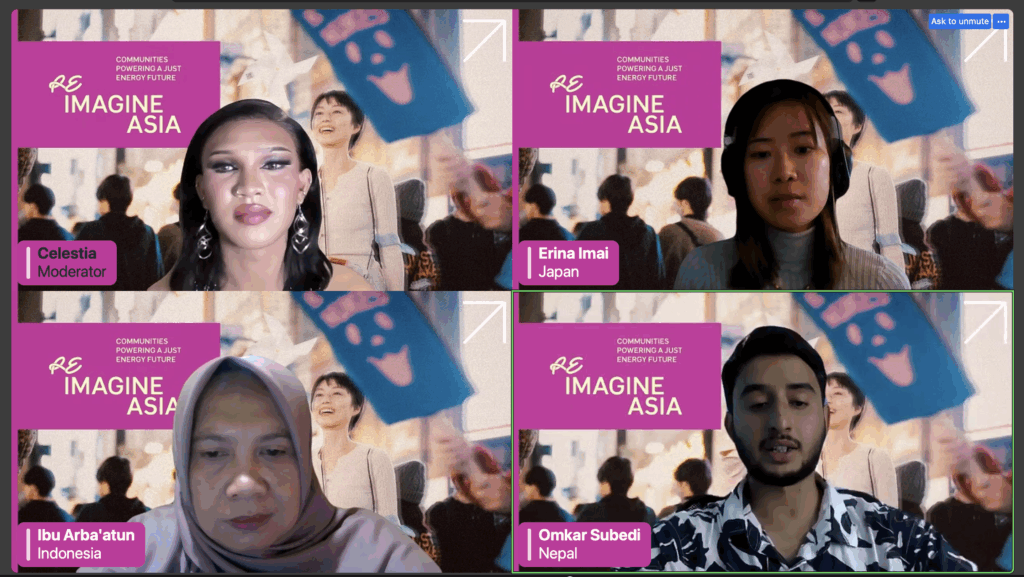FOR IMMEDIATE RELEASE | July 17, 2025
Climate groups in Asia push for energy sovereignty amid US fossil fuel trade deals
350.org Asia today launched REImagine Asia, a campaign for community-led renewable energy emphasizing the need for rich countries and polluters to pay their climate debt so that developing countries in Asia can achieve energy sovereignty.
Amid US tariff negotiations, the climate group warned against trade deals that would make Asian countries more dependent on US oil and gas imports. Reports say that Indonesia has agreed to import $15 billion worth of US oil and gas to reduce tariffs. Reports also indicate that India is planning to increase imports of Liquefied Natural Gas and crude oil from the US as part of a trade deal.
“Our future is not for sale. Asian governments should not be arm-twisted into guzzling more US oil and gas when they have committed to phasing-out fossil fuels and tripling renewable energy by 2030.”
— Chuck Baclagon, 350.org Asia Regional Finance Campaigner
“Our future is not for sale. Asian governments should not be arm-twisted into guzzling more US oil and gas when they have committed to phasing-out fossil fuels and tripling renewable energy by 2030. The complete disregard of climate commitments puts billions of Asians at greater risk of climate impacts as the planet approaches the dangerous 1.5°C limit. It also stunts the region’s vast renewable energy potential and undermines long-term energy sovereignty and security,” says Chuck Baclagon, 350.org Asia Regional Finance Campaigner.
In a webinar, 350.org Asia launched its REImagine Asia campaign which highlights successful stories of how community-led renewable energy initiatives across the region have led to access to clean and affordable energy, climate resilience, and better livelihoods.
“Communities in Indonesia have shown that renewable energy can be harnessed to uplift people’s lives. With adequate government support and financing, these initiatives could be replicated at scale.”
–Sisilia Dewi, 350.org Indonesia Team Lead
“Communities in Indonesia have shown that renewable energy can be harnessed to uplift people’s lives. With adequate government support and financing, these initiatives could be replicated at scale. On the other hand, increasing imports of US oil and gas will move us further away from the goal of replacing planet-heating fossil fuels with renewable energy. This goal is the key to our very survival and the much-needed ‘energy independence’ promised by President Prabowo himself–it should not be abandoned or sacrificed on the altar of trade expediency,” says Sisilia Nurmala Dewi, 350.org Indonesia Team Lead.

As the COP30 UN climate summit draws near, 350.org Asia announced that groups across the region will take to the streets and join the global Draw the Line mobilization in September to demand real, decisive, and urgent climate action from governments.
“Energy access is still a problem in Nepal. Having reliable, clean energy is the first step for communities to have a quality of life.”
—Omkar Subedi, Digo Bikas Institute
In Nepal, Omkar Subedi, Research fellow of Digo Bikas Institute talked about how a solar micro-grid boosted livelihoods in Dhapsung Village, an upland community in Sindhupalchowk District. He says:
“Energy access is still a problem in Nepal. Having reliable, clean energy is the first step for communities to have a quality of life. We need people-oriented energy systems where people have ownership over climate solutions, not ‘solutions’ by private corporations that profit from electricity generation.”
In Indonesia, Arbatuun talked about how the Gunung Sawur Community Microhydro in Sumberwuluh Village, Lumajang has led to women’s empowerment. She says:
“We have proven that renewable energy can create jobs and stimulate local economic growth. With energy independence, we can reduce reliance on fossil fuels and bring real sustainable development, especially in rural areas.”
—Arbatuun, Gunung Sawur Community Microhydro
“Cooperation between the government and communities is needed for widespread adoption of renewable energy. The Indonesian government must take strategic steps to invest in green energy infrastructure. We have proven that renewable energy can create jobs and stimulate local economic growth. With energy independence, we can reduce reliance on fossil fuels and bring real sustainable development, especially in rural areas.”
“Through community-led renewable energy, we can combine climate action with care, creating a new kind of energy community.”
—Erina Imai, Sun Sun Suita Community Power
In Japan, Erina Imai of Sun Sun Suita Community Power talked about how a nursing home in Suita City, Osaka uses community-owned solar energy. She says:
“Japan is facing serious climate impacts, especially typhoons. Even in a country with strong infrastructure, we need to prepare for more climate destruction, which is especially hard for vulnerable populations such as the elderly, children, and people with disabilities. They cannot easily evacuate during disasters and need energy resilience. Through community-led renewable energy, we can combine climate action with care, creating a new kind of energy community.”
Media Contact:
Ilang-Ilang Quijano,
Asia Communications Manager,
[email protected]
###
